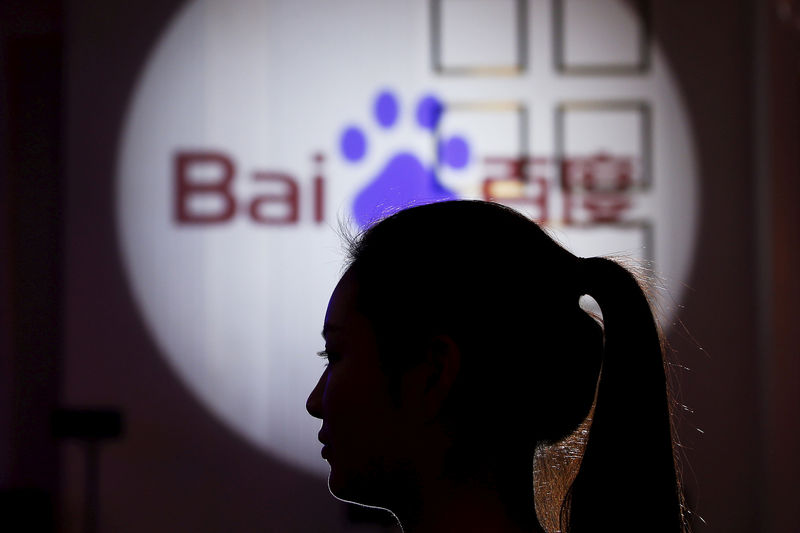(Bloomberg) -- China’s push to get its fastest-growing companies to list shares at home could trigger a feeding frenzy from investors chasing the flashiest securities in a market dominated by old-economy stalwarts.
Beijing is trying to stem an exodus to American markets -- and that’s good news for U.S. investors as it may bring a valuation boost. From Alibaba (NYSE:BABA) Group Holding Ltd. to Baidu Inc (NASDAQ:BIDU)., the country’s brightest tech stars have for years chosen to debut in New York despite once-richer valuations at home, drawn to abundant capital and the prestige of a marquee international listing. But executives say Beijing is now pondering regulatory changes to catch the next wave of debutantes like Xiaomi Corp., while helping U.S.-listed companies create Chinese Depositary Receipts to tap trillions of dollars in domestic savings.
Officials haven’t divulged specifics or even what a CDR would look like. But this week, the chief executives of Baidu, Netease Inc. and 58.com Inc. were among those who expressed interest. Xiaomi is now said to be considering a mainland listing as part of a much-anticipated 2018 coming-out party. The stock exchange in the southern city of Shenzhen is said to fast-tracking tech IPOs in 2018. Regulators have even reached out to Alibaba and Hong Kong-listed Tencent Holdings Ltd., Caixin reported, together worth almost $1 trillion.
However it shapes up, the process is likely to transform the country’s stock markets by hiking tech sector representation. Companies that choose CDRs may enjoy higher valuations because of a paucity of celebrated names, and because the individuals that make up four-fifths of trading will back brands they know.
Consider: artificial intelligence play iFlytek Co. trades at 156 times earnings -- several times the U.S. market average. When security business Qihoo 360 delisted from the U.S. and re-floated in Shanghai as 360 Security Technology Inc., its value leapt more than five times. Hong Kong-traded PC maker Lenovo Group Ltd. changes hands at a two-year earnings multiple of about 10 times: a third the valuation of Shenzhen-listed rival Inspur Electronic Information Industry Co.
“The U.S. ADRs are relatively the best companies in China and the domestic listed companies have much less quality, so you’re going to see a higher valuation,” said Blue Lotus Capital Advisor Ltd. founder Eric Wen. “This is also a good way for Chinese citizens to enjoy the growth of these companies without converting their RMB into U.S. dollars, which the government doesn’t like.”
Read more: China’s Top Tech Firms Heed the Call to Bring Listings Home
Regulators first need to untangle issues both legal and financial before going ahead with the idea, MCM Partners senior analyst Ryan Roberts said. “The market in China is just not as mature as the U.S.,” he said.
But Beijing wants to address what it views as a severe imbalance, at a time Xi Jinping is hawking the “China Dream”: a concept that embodies the country’s ascendancy and the privileges it confers upon citizens. The courtship coincides with an effort by Hong Kong to also rework regulations to enhance its attraction to the tech sector.
It’s galling to the government that there’re just nine tech companies worth more than $10 billion on local exchanges -- versus 78 in the U.S.
Chinese investors -- for whom dabbling in stocks is akin to a national pastime -- now have no easy way to share in the record-breaking growth of the consumer internet because buying U.S. securities is near-impossible for them. Alibaba has surged 170 percent since its 2014 IPO, but most locals haven’t gone along for the ride.
Tech companies of $10 billion value or more trade in Shanghai and Shenzhen at about 80 times historical earnings, about 50 percent higher than their U.S. peers, according to data compiled by Bloomberg. Apart from the mania that China’s biggest names are likely to inspire, that too suggests tech corporations can command a premium.
“Think about it: 900 plus million people who use WeChat on a daily basis have a limited exposure to Tencent, or the 400 plus million people who use Alibaba on a monthly basis don’t have a way to buy it,” said Brendan Ahern, chief investment officer for Krane Funds Advisors in New York. “An advance in the local market will be supportive of the valuations in the U.S.”
To contact Bloomberg News staff for this story: David Ramli in Beijing at dramli1@bloomberg.net, Elena Popina in New York at epopina@bloomberg.net.
To contact the editors responsible for this story: Robert Fenner at rfenner@bloomberg.net, Edwin Chan, Charlie Zhu
©2018 Bloomberg L.P.
